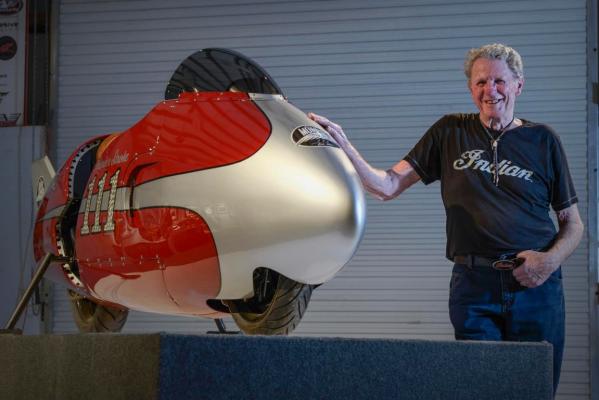One of John Munro’s earliest memories involves him riding to school on the tank of his dad’s motorbike.
He thinks he would have been 5 or 6. That memory is a cherished one because the bike would go on to become world-famous – while his dad would become a motorcyling legend.
John, now 80, is the youngest of Burt Munro’s four children, and has been living in the shadow of his dad’s success since the release in 2005 of the movie dedicated to his father’s achievements: The World’s Fastest Indian.
John, along with his three sisters, has helped Indian Motorcycles keep his father’s name alive.
Burt Munro was a motorcycle racer famous for setting an under-1000cc world record in 1967. He spent 20 years modifying his 1920 Indian motorcycle.
His life is celebrated in permanent displays around Invercargill, including both the Southland Museum and Art Gallery and E Hayes and Sons.
Following the success of The World’s Fastest Indian, the Southland Motorcycle Club created the Burt Munro Challenge to honour him, his love of speed and motorcycles. The challenge is one of New Zealand’s major motorsport events.
Ahead of the Burt Munro Challenge this year, John relaxes at home with a glass of wine and recalls his colourful childhood and “normal” family life. It was full of vacations and events and helping his dad in the shed at their family home in Tramway Rd.
John fondly recalls working together on bikes and cars, holding a spanner on the other end of a bolt.
His father was a hard-working man. Burt would often come home after a busy day at work, sit by the fire and read the newspaper.
In 1945, when John was 11 or 12, his parents split and John’s mother, Florence Beryl Martyn, left the city with him and two of his sisters. He went to school in Hastings and later Napier.
It was seven or eight years before John was reunited with his father.
In 1953, when John was 19, he rode his Velocette, one of Burt’s favourite bikes, from Auckland (where he was living) to Invercargill to spend the Christmas holidays with his dad and other family.
The pair continued to stay in touch.
Once the family had gone, Burt had plenty of time to spend doing what he loved. In fact, he spent 57 years doing what he loved.
He would devote hours to his bikes and if he was preparing for a race would work day and night.
Burt brought a property in Bainfield Rd but was unable to build a house because he couldn’t get a permit for the type of house he wanted.
So, not long after the second world war, when building materials were sparse and the biggest garage was 20 feet by 10 feet, he built his own garage.
He lived in it for 25 years and John remembers it well.
Did it have any facilities?
“It had a lathe. A grinder. A vice. A bed. What else do you want?”
After 25 years, Burt built a house on the property. When he sold it, the house was moved and used as a crib and another house was built.
John was 44 when Burt died of natural causes in 1978.
One of John’s most prized possessions is a scrapbook his father had given him, full of motorbikes, events and newspaper clippings.
John’s life was relatively anonymous until the release of The World’s Fastest Indian. Until then, people across the world, including many in Southland, thought his father was nothing but a “crazy old bugger riding bikes in his 70s”, but opinions quickly changed when the movie was released.
People also got to know exactly who John Munro was and, even now, he’ll get stopped in the street and asked if he’s the famous Burt Munro’s son.
Film director Roger Donaldson made a documentary about Burt in the 1970s and, at the time, said he wanted to make a movie.
He finally did that 30 years later.
John recalls Roger staying with him and his wife, Margaret, going through family history and talking to other family members and people who Burt had ridden with. He spent six years writing the script and started filming in 2004.
Burt’s children spent plenty of time on set.
John remembers travelling to the salt flats in Utah for the first time to watch filming. He also watched a large part of the filming in Invercargill, Winton, Tisbury and Timaru.
“I was invited to be in it. But I said to him, I’m no bloody actor. But, in hindsight, it actually would have been nice.”
A passion for motorbikes runs deep in the family. John himself has owned and tinkered with several bikes and his youngest son has travelled the world on a motorcycle.
Mechanics and inventing also runs in the family.
One of Burt’s uncles, Jim, invented the Munro topdresser and the Munro seed sower and John has also patented his own inventions.
Among those are his innovative way of insulating underground pipes for hot and chilled water, and control systems for school boiler houses.
John was a cabinet maker, farmer, earthmover and telephone operator before starting his own heating and ventilation business. He’s still inventing but now works from home with his wife in the energy management industry.
At the age of 80, he has no desire to retire. “My brain is working 24 hours a day. I gotta keep up with it.”
He also has seven children (aged between 42 and 57), 21 grandchildren and 15 great grandchildren, and a great-great grandchild is due.
John has been to every Burt Munro Challenge. He and his siblings are invited to do the race starts and prize presentations. His has carried on his father’s legacy and has been an ambassador for Indian Motorcycles since his father went to Bonneville.
“Indian Motorcycles have done Dad proud and we all want to continue supporting that. As an ambassador for Indian, I’m happy to do that because of what they’ve done to support dad’s achievements.”
When Polaris Industries bought the brand about three or four years ago, they wanted to build something to commemorate Burt, and got in touch with John, wanting to call a new machine the Spirit of Munro.
“As a family, we were delighted to give them permission to do so.”
Everywhere he goes, John says ‘thanks Dad’, because without him, he never would have got to participate in such events.
Source: Spirit of Munro rides on | Stuff.co.nz




